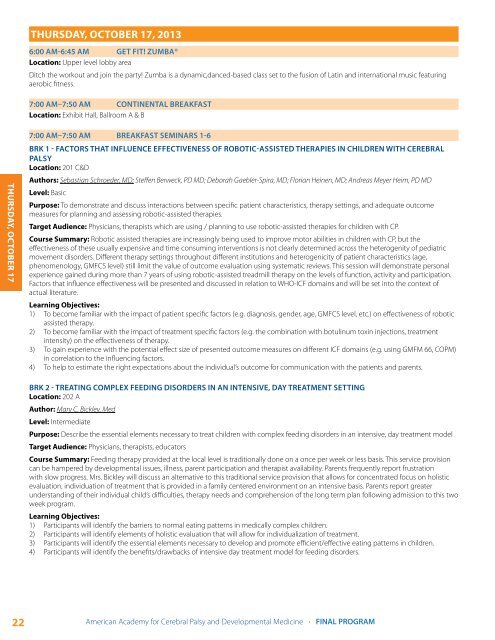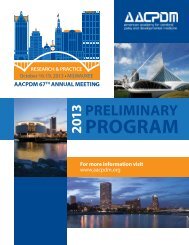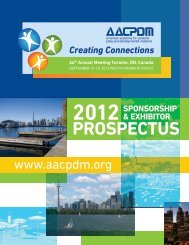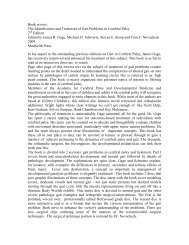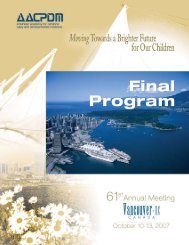Thursday, October 17, 20136:00 am-6:45 am Get Fit! Zumba®Location: Upper level lobby areaDitch the workout <strong>and</strong> join the party! Zumba is a dynamic,danced-based class set to the fusion of Latin <strong>and</strong> international music featuringaerobic fitness.7:00 am–7:50 am Continental BreakfastLocation: Exhibit Hall, Ballroom A & BTHURsday, October 177:00 am–7:50 am Breakfast Seminars 1-6BRK 1 - FACTORS THAT INFLUENCE EFFECTIVENESS OF ROBOTIC-ASSISTED THERAPIES IN CHILDREN WITH CEREBRALPALSYLocation: 201 C&DAuthors: Sebastian Schroeder, MD; Steffen Berweck, PD MD; Deborah Gaebler-Spira, MD; Florian Heinen, MD; Andreas Meyer Heim, PD MDLevel: BasicPurpose: To demonstrate <strong>and</strong> discuss interactions between specific patient characteristics, therapy settings, <strong>and</strong> adequate outcomemeasures <strong>for</strong> planning <strong>and</strong> assessing robotic-assisted therapies.Target Audience: Physicians, therapists which are using / planning to use robotic-assisted therapies <strong>for</strong> children with CP.Course Summary: Robotic assisted therapies are increasingly being used to improve motor abilities in children with CP, but theeffectiveness of these usually expensive <strong>and</strong> time consuming interventions is not clearly determined across the heterogenity of pediatricmovement disorders. Different therapy settings throughout different institutions <strong>and</strong> heterogenicity of patient characteristics (age,phenomenology, GMFCS level) still limit the value of outcome evaluation using systematic reviews. This session will demonstrate personalexperience gained during more than 7 years of using robotic-assisted treadmill therapy on the levels of function, activity <strong>and</strong> participation.Factors that influence effectiveness will be presented <strong>and</strong> discussed in relation to WHO-ICF domains <strong>and</strong> will be set into the context ofactual literature.Learning Objectives:1) To become familiar with the impact of patient specific factors (e.g. diagnosis, gender, age, GMFCS level, etc.) on effectiveness of roboticassisted therapy.2) To become familiar with the impact of treatment specific factors (e.g. the combination with botulinum toxin injections, treatmentintensity) on the effectiveness of therapy.3) To gain experience with the potential effect size of presented outcome measures on different ICF domains (e.g. using GMFM 66, COPM)in correlation to the influencing factors.4) To help to estimate the right expectations about the individual’s outcome <strong>for</strong> communication with the patients <strong>and</strong> parents.BRK 2 - TREATING COMPLEX FEEDING DISORDERS IN AN INTENSIVE, DAY TREATMENT SETTINGLocation: 202 AAuthor: Mary C. Bickley, MedLevel: IntermediatePurpose: Describe the essential elements necessary to treat children with complex feeding disorders in an intensive, day treatment modelTarget Audience: Physicians, therapists, educatorsCourse Summary: Feeding therapy provided at the local level is traditionally done on a once per week or less basis. This service provisioncan be hampered by developmental issues, illness, parent participation <strong>and</strong> therapist availability. Parents frequently report frustrationwith slow progress. Mrs. Bickley will discuss an alternative to this traditional service provision that allows <strong>for</strong> concentrated focus on holisticevaluation, individuation of treatment that is provided in a family centered environment on an intensive basis. Parents report greaterunderst<strong>and</strong>ing of their individual child’s difficulties, therapy needs <strong>and</strong> comprehension of the long term plan following admission to this twoweek program.Learning Objectives:1) Participants will identify the barriers to normal eating patterns in medically complex children.2) Participants will identify elements of holistic evaluation that will allow <strong>for</strong> individualization of treatment.3) Participants will identify the essential elements necessary to develop <strong>and</strong> promote efficient/effective eating patterns in children.4) Participants will identify the benefits/drawbacks of intensive day treatment model <strong>for</strong> feeding disorders.22<strong>American</strong> <strong>Academy</strong> <strong>for</strong> <strong>Cerebral</strong> <strong>Palsy</strong> <strong>and</strong> Developmental Medicine • FINAL PROGRAM
Thursday, October 17, 20137:00 am–7:50 am Breakfast Seminars 1-6BRK 3 - MANAGEMENT OF CHRONIC PAIN IN CHILDREN WITH CHRONIC MEDICAL CONDITIONSLocation: 202 CAuthor: Joelle Mast, PhD MDLevel: IntermediatePurpose: Chronic pain is under recognized <strong>and</strong> undertreated in children with chronic medical conditions such as cerebral palsy <strong>and</strong> sicklecell anemia. The purpose of this seminar is to increase awareness <strong>and</strong> provide management guidelines <strong>for</strong> the treatment of chronic pain.Target Audience: Pediatricians, neurologists, psychologists, physiatrists, orthopedic <strong>and</strong> neuro-surgeons, physical <strong>and</strong> occupationaltherapists, speech <strong>and</strong> language therapists, nurses, concerned with the care of people who have cerebral palsy <strong>and</strong> other chronic medicalconditionsCourse Summary: This lecture will familiarize the audience with the spectrum of pain syndromes, such as CPRS <strong>and</strong> RLS as well asmusculoskeletal pain. Assessment tools, both pain scales <strong>and</strong> functional scales will be reviewed. Management including when <strong>and</strong> how touse opiate therapy <strong>and</strong> how to treat side effects will be discussed. Risk assessment <strong>and</strong> medico-legal issues will be covered.Learning Objectives:1) Underst<strong>and</strong> the presentation of chronic pain in children.2) Be able to manage chronic pain with both pharmacologic <strong>and</strong> nonpharmacologic interventions.3) Know treatments <strong>for</strong> side effects of pain medications.4) Underst<strong>and</strong> the medicolegal requirements of pain management in terms of accountability of both patient <strong>and</strong> practitioner.BRK 4 - BONE HEALTH IN CHILDREN WITH PHYSICAL DISABILITIESLocation: 201 BAuthors: Steven Bachrach, MD; Tessa Gresley-Jones, BScN MN NP-PaedsLevel: IntermediatePurpose: To review the evidence around prevention, surveillance <strong>and</strong> treatment of osteoporosis <strong>and</strong> fragility fractures in children withmobility restrictions while providing practical strategies to translate knowledge into practice on this topic.Target Audience: Physicians, nurses, therapists, parentsCourse Summary: Children with physical disabilities <strong>and</strong> mobility restrictions are at increased risk <strong>for</strong> developing osteoporosis.Approximately 20% of children <strong>and</strong> young adults with cerebral palsy who cannot walk independently develop fragility fractures. Fracturescan cause significant pain <strong>and</strong> impairment, as well as impact family functioning. There<strong>for</strong>e, it is important <strong>for</strong> caregivers <strong>and</strong> health careproviders to know how to improve bone mineral density <strong>and</strong> prevent fragility fractures in these children. We will review the evidence aroundprevention, surveillance <strong>and</strong> treatment of osteoporosis <strong>and</strong> fragility fractures in children with mobility restrictions. We will also introduce aclinical practice guideline <strong>for</strong> children with <strong>Cerebral</strong> <strong>Palsy</strong> at risk <strong>for</strong> osteoporosis as well as practical tools to facilitate knowledge translationof this practice guideline. The presenters will prompt participants to engage in discussion about gaps in the evidence <strong>and</strong> challenges in theirown clinical practice, specifically around monitoring vitamin D levels, use of DXA scans <strong>and</strong> decision making around bisphosphonates.Learning Objectives:1) To identify key components of the prevention <strong>and</strong> evaluation of low bone mineral density in children with disabilities.2) To develop skill in implementing nutrition based interventions <strong>for</strong> preventing <strong>and</strong> treating low bone mineral density in children withdisabilities.3) To underst<strong>and</strong> how bone density is measured in patients with disabilities <strong>and</strong> what the measurements mean.4) To underst<strong>and</strong> the evidence <strong>for</strong> treatment modalities of osteoporosis of children with physical disabilities, specifically bisphosphonates.THURsday, October 17AACPDM 67 th Annual Meeting • Research & Practice 23
- Page 1 and 2: 2013 FINALProgramFor more informati
- Page 3 and 4: 2012-2013 BOARD OF DIRECTORSPreside
- Page 5 and 6: Meeting at a GlanceFRIDAY, OCTOBER
- Page 7 and 8: 67th Annual MeetingOctober 16-19, 2
- Page 9 and 10: AACPDM 67 th Annual Meeting2013 Mob
- Page 11 and 12: General Meeting InformationTicketed
- Page 13 and 14: Membership BenefitsHow can you bene
- Page 15 and 16: Invited LecturersStrategic Research
- Page 17 and 18: Grants and ScholarshipsAACPDM Resea
- Page 19 and 20: Wednesday, October 16: Pre-Conferen
- Page 21: Wednesday, October 16: Pre-Conferen
- Page 25 and 26: Thursday, October 17, 20138:00 am-1
- Page 27 and 28: Thursday, October 17, 201310:45am -
- Page 29: Thursday, October 17, 20132:00 pm -
- Page 32 and 33: Thursday, October 17, 2013THURsday,
- Page 34 and 35: Thursday, October 17, 2013THURsday,
- Page 36 and 37: Friday, October 18, 20136:00 am-6:4
- Page 38 and 39: Friday, October 18, 20137:00 am-7:5
- Page 40 and 41: Friday, October 18, 201310:30 am-12
- Page 42 and 43: Friday, October 18, 201312:30 pm -
- Page 44 and 45: Friday, October 18, 20134:00 pm - 6
- Page 46 and 47: Friday, October 18, 20134:00 pm - 6
- Page 48 and 49: Friday, October 18, 20134:00 pm - 6
- Page 50 and 51: Saturday, October 19, 20137:00 am-7
- Page 52 and 53: Saturday, October 19, 20138:00 am-1
- Page 54 and 55: Saturday, October 19, 201310:15 am-
- Page 56 and 57: Saturday, October 19, 20131:30 pm-3
- Page 58 and 59: Saturday, October 19, 20131:30 pm-3
- Page 60: Saturday, October 19, 20131:30 pm-3
- Page 63 and 64: Scientific PostersSP1 - REDUCTION I
- Page 65 and 66: Scientific PostersSP38 - IMPACT OF
- Page 67 and 68: Demonstration PostersDP1 - TRACKING
- Page 69 and 70: AACPDM Past and Future Presidents19
- Page 71 and 72: Exhibiting and Sponsoring Organizia
- Page 73 and 74:
Exhibiting and Sponsoring Organizia
- Page 75 and 76:
Disclosure IndexA=Research and inst
- Page 77 and 78:
Disclosure IndexG9 Park, M (F) Chun
- Page 79 and 80:
Disclosure IndexInvited SpeakersBac
- Page 81 and 82:
Author IndexChan, Jeremy ..........
- Page 83 and 84:
Author IndexGutman, Karli .........
- Page 85 and 86:
Author IndexMatsumoto, Hiroko. ....
- Page 87 and 88:
Author IndexSSaavedra, Sandra .....
- Page 89:
Author IndexWingate, Martha .......


